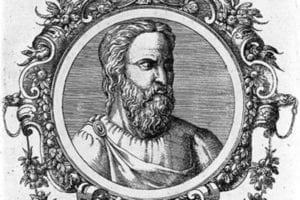
Aretaeus was born in Cappadocia during the Roman hegemony over Greek Asia Minor. Few details are known about his life, but it is believed he studied in Alexandria and practiced medicine in Rome around the second century AD. After his death he was forgotten until rediscovered during the Renaissance, when a Latin translation of his eight-volume treatise appeared in Venice and two years later the original Greek text was published in Paris.
Aretaeus is a most valuable and original medical writer, who avoided speculations and detailed his experience in a clear and vivid style. He led a revival of the teachings of Hippocrates, taking him as his model and ranking second only to him in keen observation and ethics. Whether he belonged to a particular school of medicine such as the pneumatics or the eclectics is not known. He seems to have understood the direction of the blood in the veins and may have been the only physician of antiquity who listened to the heart.
He offered clinical descriptions of asthma, pneumonia, pleurisy, angina, diphtheria, jaundice, elephantiasis, gonorrhea, dysentery, tetanus, cancer of the uterus, and celiac disease. He knew about epilepsy, stroke, headaches, hysteria and mental diseases—dividing the latter into melancholia, meaning depression, and established insanity. He knew about lead colic. He described the melting of the flesh into the urine of diabetes and may have been the first to use the word diabetes. He commented on leprosy, describing its appearance and believing it was transmitted “by the breath of an infected person through the air.”
He also described kidney stones and taught that the patient should be jolted in order to put the stone into motion, recommending that swings could be used for that purpose. It is believed he was familiar with tracheostomies. He freely administered purgatives and narcotics, and he practiced venesection, but warned against removing too much blood. He used castor oil for diseases of the nerves and hellebore for gout, the trephine for some cases of epilepsy, and a catheter for bladder obstruction. He removed urinary stones by cutting below the scrotum and then up to the bladder.
He used herbs and became famous as an herb gatherer. He advised treating insomnia by rubbing the feet with oil, patting the head, or stroking the temples and ears. Sleep might be induced by exposing the patient to whatever he is familiar, such as resting the sailor in a boat to listen to the murmur of the waves, having the musician listen to the harp, and the teacher to the tattle of children. For skin diseases he advised treatment with an ointment that is not runny and does not stain the bedclothes. Finally, when the patient has an incurable disease and can no longer be helped, the physician should mourn him as a man, “for that indeed is a physician’s sad lot.”

Leave a Reply